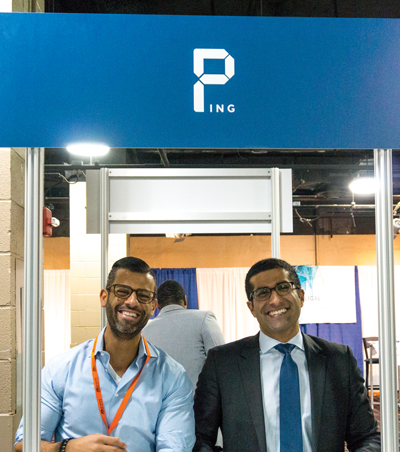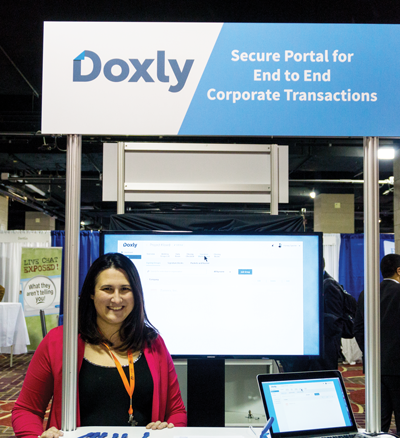Competitions boost interest and involvement at ABA Techshow 2017

Ping CEO Ryan Alshak and COO Kourosh Zamanizadeh. Photos by Jerry Lee.
Adding some spice to the agenda of the ABA Techshow 2017, two competitions debuted at the March event, offering access to justice for military veterans and access to technology for law firms seeking legal services.
The inaugural Startup Alley competition, hosted by Robert Ambrogi of LawSites and Mary Juetten of Evolve Law, pitted 12 legal startups against one another in a knockout-style contest, with audience members voting for the winners.
All competitors received a discount to display their services in the exhibit hall, with the first-place winner getting a $5,000 advertising package with Above the Law. The participants included trust accounts simplification tool TrustBooks; lawyer matching services LegalClick, AggregateLaw and Court Buddy; Alt Legal, trademark and docketing software; ClariLegal, a platform for buying legal services; eBrevia, contract analysis; Just Legal, support staffing; and Paladin, a provider of pro bono opportunities.
First place went to Ping, an automated timekeeping program that allows lawyers to automatically track and bill their hours without starting or stopping a timer. According to Ping CEO Ryan Alshak, most lawyers have to keep track of time manually and rely on a lot of guesswork when they do their billable hours. It was a phenomenon he knew all too well.
“I was a BigLaw lawyer for three years, and I was the worst timekeeper in America,” he told the ABA Journal. “I’d wait until the end of every week and then go back and guess what my billable hours were. I knew I was leaving a lot of time on the table.”
By his estimation, lawyers can lose up to $15,000 a month simply because they aren’t tracking their hours accurately.
In addition to timekeeping, Ping tracks data so lawyers can gain more insight into how their practices work and create more accurate budgets. Alshak started Ping last May—a month after he quit his law firm job. The technology is currently part of a pilot program with a law firm of 40 lawyers. His goal is to go to market by the summer.
Second place went to Doxly, a secure portal and management platform for corporate transactions. UniCourt, a program that provides easy access to state and federal case law and legal analytics, finished third.
Videos for several of the businesses are on the ABA Journal YouTube channel.
And during the traditional morning plenary session, Techshow chair Adriana Linares announced the winners of the Tech for Justice Hackathon plus Veterans event.

Doxly CEO Haley Altman
First place and $5,500 went to Carry On, a project to help victims of military sexual trauma. The service features a chatbot, a system of alerts, forums and real-time chat to connect victims with services and provide them with resources on how to file a report, get help or learn about their symptoms.
Taking home the second-place prize and $2,500 was Veterans Will Center, an interactive estate-planning checkup service to determine what probate documents a veteran should have and where to go to get the documents generated free of charge or at a low price.
The hackathon also awarded a $1,500 third-place prize to Vet’s Panic Button, an app that quickly links a suicidal veteran with other veterans willing to help. A $500 fourth prize went to the Service Connection, an online portal for veterans to learn more about and apply for benefits.
A list of projects, as well as the people who worked on them, can be found on the Devpost website.
“We are excited by the tremendous support we had from everyone,” Jeffrey Aresty, president of Internetbar.org and co-organizer of the event, wrote in an email. “The veterans groups have all committed that they will use the justice innovations our teams invented both for themselves and to be a beacon for all who need access to justice.”
A roundup of ABA Journal coverage of the show can be found at ABAJournal.com.
This article originally appeared in the June 2017 issue of the ABA Journal with the headline "Tech Trials: Competitions boost interest and involvement at this year’s event."



